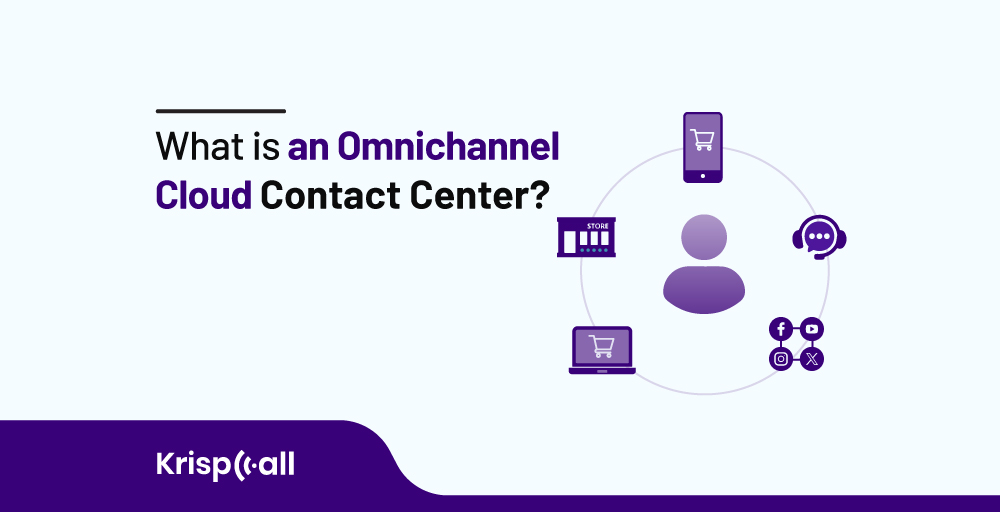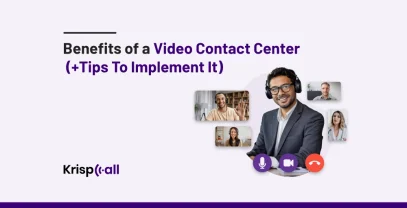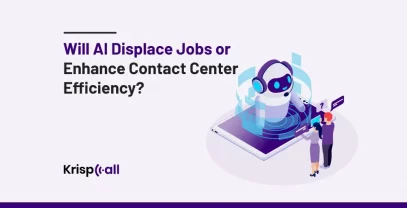As a business owner, you should certainly know that your customers expect seamless service from all contact centers, whether it be yours or someone else’s, and across all channels, and by that, we mean ‘Each and Every Channel.’
Now, in this era of modernity, businesses often look for solutions that they can employ to become free of repetitive & tasks, improve customer service and operational efficiency, and rarely get their eyes on the perfect one.
Well, that’s where they need excellent omnichannel cloud contact center software. With it, they can just revolutionize the way they interact with their customer, be it through live chats, social media, SMS, or the CRM system.
In this article, we will discuss what omnichannel contact centers are, how they work & what features they often come with, and why they are essential for better service delivery. We will also look at the best practices & challenges you need to do or can face when implementing one, and finally, we will mention the four best omnichannel cloud contact center software providers.
🔑 Main Points From The Article
- Omnichannel Contact Center is a cloud-based software that brings all customer interactions to a single point.
- It comes with features like a unified framework, multi-channel integrations, reporting & analytics, AI-powered routing, and workforce management.
- An omnichannel cloud contact center software has the sole purpose of improving customer experience, and its working revolves around it.
- RingCentral, Nextiva, Vonage, and Nice CXone offer the best omnichannel software.
Let’s get going!
What is an Omnichannel Cloud Contact Center?
An Omnichannel Cloud Contact Center is essentially a customer service hub that operates just like a regular contact center. The difference lies in its cloud-based software’s use to handle customer interactions across multiple communication channels such as phone calls, SMS, voicemail, chat, email, and social media.
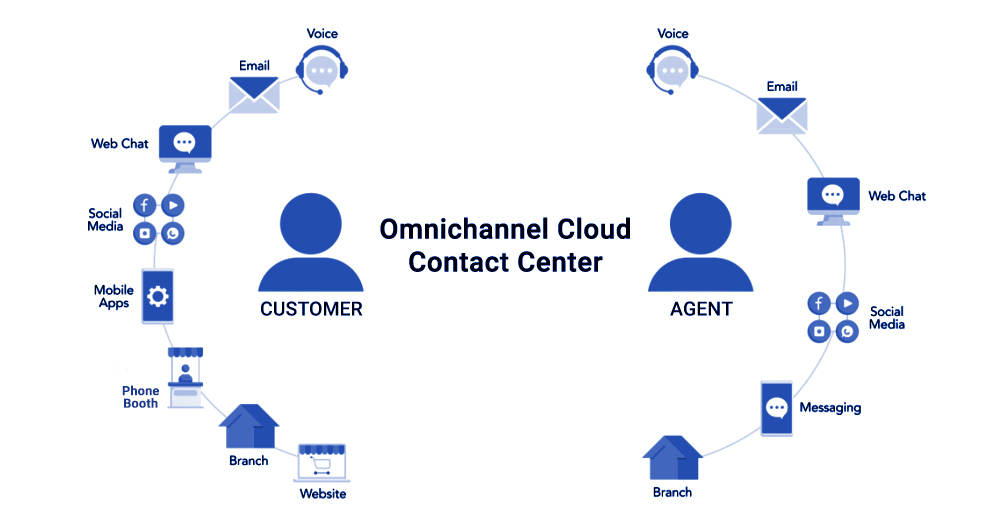
The software unifies customer interactions across multiple channels into one unified system. It allows support representatives to see every customer interaction on a single user interface.
Furthermore, its deployment and operation intend to provide a seamless experience to customers regardless of how they choose to connect with the contact center.
How does the Omnichannel Contact Center work?
As said earlier, omnichannel contact center software brings every interaction to a single point. This simply means a conversation or chat that started and was being carried out on one channel can easily be switched to a completely different one, for example, a call, and be picked up right where it was left or the other way around.
The technicalities behind the working of such software are a bit tricky to figure out. But to make things easier for you, here’s the simplest of explanations:
Step 1: A customer connects with a contact center through multiple channels, whether it’s through a phone call, a text message, or an email.
Step 2: All the messages sent by the customer end up in one central spot, like a super inbox for the entire team.
Step 3: The platform matches each customer with the best agent based on their needs and skill set, if built to do so, and then the conversation starts.
Step 4: If they need, customers can easily switch from a chat session to a phone call, bypassing the hassle of having to repeat everything!
Step 5: As a closing touchpoint, all the agents now have access to a customer’s full history, including past interactions and notes, allowing them to give personalized assistance.
What are the Features of the Omnichannel Contact Center?
When it comes to any solution used in a business, you should look into its features and functions before implementation. And the same goes for omnichannel contact center systems.
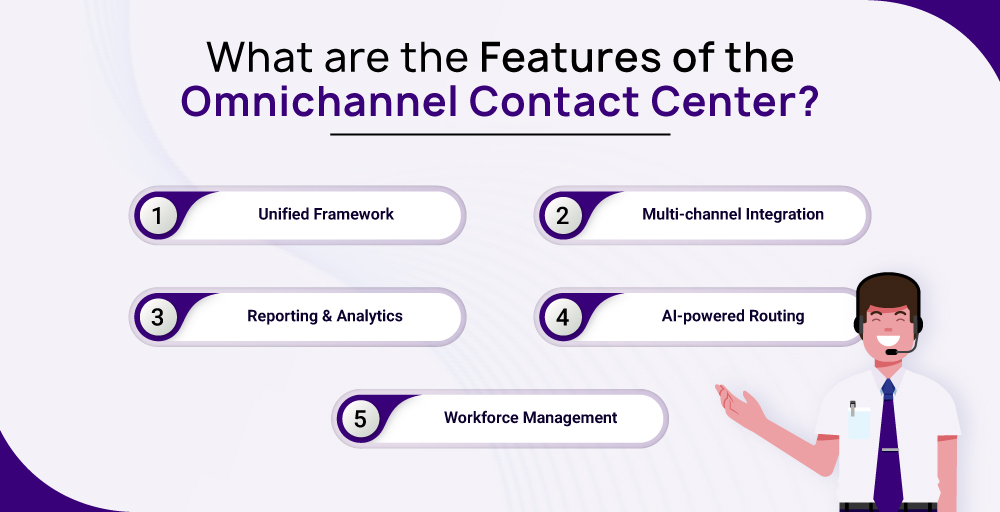
So, to make you familiar with all of its elements, here is a rundown of the top features you’ll find in such systems:
1. Unified Framework
The most distinguishing feature of an omnichannel call center solution is its ability to act as an intersection that brings all the conversations on various platforms into a single one.
This just completely eliminates the need to jump between different apps or softwares. With it, agents get access to all the conversations, regardless of the type, by whom, or the previously used channel.
2. Multi-channel Integration
It is said that if it’s cloud-based, then it should be versatile. Well, omnichannel cloud contact centers are on top of that and have everything one can possibly want.
These systems seamlessly integrate various communication channels, such as phone, email, chat, social media, and more, allowing customers to switch between communication channels without losing context on the flip side, giving agents the customer’s history or preferred communication channel.
3. Reporting & Analytics
Next up, we have its reporting and analytical features that are designed to give businesses the upper hand in all aspects.
A good omnichannel contact center software gives businesses the most advanced analytics to gather & analyze data from multiple channels in real-time and other options that can enable companies to make informed decisions, track performance, and identify areas for improvement.
4. AI-powered Routing
Another essential feature of such a system is AI-powered tools that analyze past interactions and customer data to provide agents with real-time insights, suggestions, and more.
With these solutions, inquiries can be automatically directed to the most suitable agent based on availability, skills, and workload, thus saving ‘precious’ time. These can also be used to organize customer requests, objections, and other information.
5. Workforce Management
Finally, we have its feature that simplifies everything and equips agents with all the necessary tools they need to run tasks on a single interface.
With such systems, call center reps are given all the power to ensure a customer gets the best possible support by making use of customer data & history, knowledge bases, real-time contact center analytics, and similar shared tools used for service delivery.
Why is an Omnichannel Contact Center Important for Better Customer Experience?
Now that you know all about the nitty-gritty details of an omnichannel contact center well, it’s time for you to learn and hammer out its importance for a better customer experience and make the best possible use of Omnichannel contact center benefits.
It is a universal fact that- these days, customers expect seamless interactions across various channels and always. And that’s why omnichannel contact centers are things of the most importance and actually make a difference.
So, let’s discuss why these systems are of so much importance.
- Offers More Control and Choice: Businesses using these solutions have access to a variety of communication options, like phone, email, live chat, social media, you name it, hence giving customers a chance to choose their preferred method and get in touch with them.
- Better for Personalized Service: With these, you also get options to collect and store each and every customer data from all channels into one central repository. This allows agents to personalize interactions, addressing individual needs and preferences more effectively.
- Increases Efficiency and Convenience: As part of the objective, these systems allow customers to reach out on their own terms, regardless of time or location. Additionally, as said earlier too, agents can resolve issues quickly and eliminate repeat contacts by making use of customer data.
- Provides Valuable Insights: An omnichannel platform brings everything together, so with it, businesses get a comprehensive set of data on customer interactions across all channels. This allows them to track performance metrics, identify trends, and gain valuable information about customer behavior.
- Improves Customer Service: As most of the work is done by the system itself, agents can focus on improving the service delivery. The system’s assistance, combined with human ability, can result in enhanced convenience, personalization, and efficient resolution.
- Contributes to Growth: Businesses using this software obviously have a competitive edge and stand out from others. And we all know providing a consistent and seamless omnichannel experience across all touchpoints builds trust and strengthens a brand’s image in the eyes of its customers.
Multichannel and Omnichannel Contact Center: Difference
For the less tech-savvy ones, both names might sound like synonyms. But there’s a huge difference as the key difference between both lies in the integration capabilities and level of conversational/service continuity that a customer can access.
Here is the simplest way to tell you the difference:
A Multichannel Contact Center offers multiple contact methods (phone, email, chat), but each channel acts as a separate contact point. Omnichannel Contact Centers, on the other hand, seamlessly connect all channels into a single one. Customer data and interaction history flow freely through that point, hence observing a unified experience.
If you’d like to dig a bit deeper and learn more about the differences, here’s a comparison table
| Characteristics | Multichannel | Omnichannel |
| Channel Integration | Stacks: separate systems for each channel | Unified platform: all channels are seamlessly integrated |
| Customer Journey | Disjointed: customers jump between channels with repeated information | Continuous: context and history are preserved across channels |
| Agent Specialization | Channel-specific: agents handle only one channel | Cross-channel: agents can switch between channels |
| Data Visibility | Limited, and the data is confined to each channel | A comprehensive and in-depth view of customer interactions |
| Customer Experience | Fragmented, potential for frustration and inefficiency | Personalized, smooth, and efficient interactions |
| Technology Investment | Lower and independent systems for each channel | Higher and integrated platform and advanced features |
Hope that brings up everything you’ve been looking for. Moving on!
What are the Best Practices of Omnichannel Contact Centers?
Like all systems, when using and implementing one, there’s a list of things you are expected to do and follow.
Why & for what? It’s an easy answer, which is to obtain the best possible outcome. So, to help you out with that, we’ve listed all of those.
- Map the Customer’s Journey: In a similar fashion to taking baby steps, try to understand your ideal customer journey inside out to identify pain points, preferences, and opportunities for improvement.
- Integrate your Channels: Once you understand what you need to do, integrate a unified platform or middleware to connect all your communication channels that can touch the customers’ issues and are always available.
- Access to Self-Service and Live Agents: As the next best thing to do, ensure the system can be easily used from all ends. Ensure that the customers have easy access to both self-service options & live agents.
- Offer Seamless Omnichannel Routing: Following that, remember to implement a smart routing system that is based on agent skills, availability, and workload. In short, this ensures the customer’s query reaches the most qualified agent.
- Train Agents for Omnichannel Expertise: To make the most of your omnichannel contact center solution, train your representatives to the fullest while equipping them with the skills and knowledge to handle queries across all channels efficiently and effectively.
- Allocate the Right Amount of Resources to Each Channel: As all things should be, make use of pre-established key metrics like first contact resolution rate, customer satisfaction, and channel usage to balance the resource allocation, here, time & money, for efficient service delivery.
- Monitor and Optimize Continuously: Lastly, this one is a must-do; use all the data collected through the system to identify areas for improvement and constantly mold & refine your omnichannel strategy.
What do you mean by Omnichannel Strategy, and how do you create it?
As of now, we’ve discussed everything about Omnichannel Cloud Contact Centers but little about the implementation process. So how’s it going to happen?
Honestly, those are completely different contexts and are often referred to as the Omnichannel contact center strategies.
And what’s that? – An omnichannel strategy is a customer-centric approach that focuses on creating a unified and consistent customer experience across all channels, both digital and physical, through the means of implementing an omnichannel service.
Omnichannel Strategy Steps
Here are the basic steps that businesses can take to implement an omnichannel strategy and be successful with it:
- Firstly, conduct customer research to understand customers’ preferences and expectations.
- Secondly, examine your existing channels in terms of customer experience and performance and identify the strengths and weaknesses.
- Thirdly, utilize a technology enabling you to conduct customer interactions across channels, share customer data, and cover all your necessities.
- Next, Optimize your channels for a seamless experience and deliver a uniform brand presence across all channels.
- Finally, continuously measure and refine your strategy to adapt and improve it based on acquired data and customer feedback.
If you follow all these adequately, you are surely to have a complete strategy that can used to set up an omnichannel cloud call center of the best potential. Also, remember to buy the software from a reputable provider. Don’t worry; we will get to that in a moment.
What are the Challenges of Omnichannel Cloud Contact Center?
In the same way as any human-made item, managing an Omnichannel Cloud Contact Center is not free of hurdles and challenges that can significantly impact the efficiency of the call center and customer experience.
To make you a bit more familiar with those and to make sure you dont struggle. Here are a bunch of the most vital ones:
- Integration Struggles: The most notable one of the difficulties that businesses surely face when using a cloud omnichannel system is the difficulty and complexity related to combining data from various channels (phone, email, chat, etc.) into a single and unified view. It requires some understanding of the technical stuff involved.
- Data Fragmentation: This issue can be detected from afar. When working with or implementing such a detailed system, it is natural that some of the data gets left behind. The existence of isolated data is problematic itself, and on top of that, it can lead to inconsistent customer experiences.
- Inadequate Agent Training: Another major hurdle that cloud contact centers of all types face is the inability of the representatives to understand and make full use of the system properly. For the system to fully function, agents need to be adept at using the omnichannel platform and adapting their communication style to each channel.
- Channel Management: Lastly, you may also need help handling customer inquiries across different channels. Working with it requires robust technology and well-defined workflows. You should remember that juggling between diverse communication modes and ensuring smooth transitions can be complex.
Having learned everything about omnichannel cloud call center systems, you may be thinking about where to acquire one.
While there are hundreds of providers out there in the market, choosing one is a fairly tricky task. Worry not; to help you with that, we have done the research for you and put forth the four best Omnichannel Cloud Contact Center Providers in 2024.
4 Best Omnichannel Cloud Contact Center Providers in 2024
Here are the 4 Best Omnichannel Cloud Contact Center Providers in 2024 based heavily on these factors:
- Omnichannel Experience.
- Integrational Capabilities.
- User-Friendly Interface.
- Scalability.
Here is what we know about the Top Omnichannel Cloud Contact Center Providers in 2024
| Provider | Pricing | Top Features Offered | Best For |
| RingCentral Contact Center | Custom quote | Extensive omnichannel supportStrong analytics AI-powered insights Workforce optimization tools | Small to medium-sized companies |
| Nextiva Contact Center | Starts at $50 per user/month | Seamless CRM integration Robust call routing and automationAgent performance managementHigh call volume capacity | Small to medium businesses & enterprises |
| Vonage Contact Center | Customized | Flexible pay-as-you-go optionsAdvanced reporting and analyticsReal-time agent coaching Strong CRM integrations | Startups, small to medium businesses |
| Nice CXone | Custom quotes based on usage and features | AI-powered customer routing and self-service Advanced fraud detection Omnichannel analytics Workforce engagement tools | Medium to large businesses |
1. RingCentral Contact Center
RingCentral’s omnichannel contact center software is the leading solution in the market by offering a wide range of features to enhance customer service and agent productivity. It provides CX software that is simple, smart, and fast and can be used for cross-company collaboration or to provide a seamless customer experience.
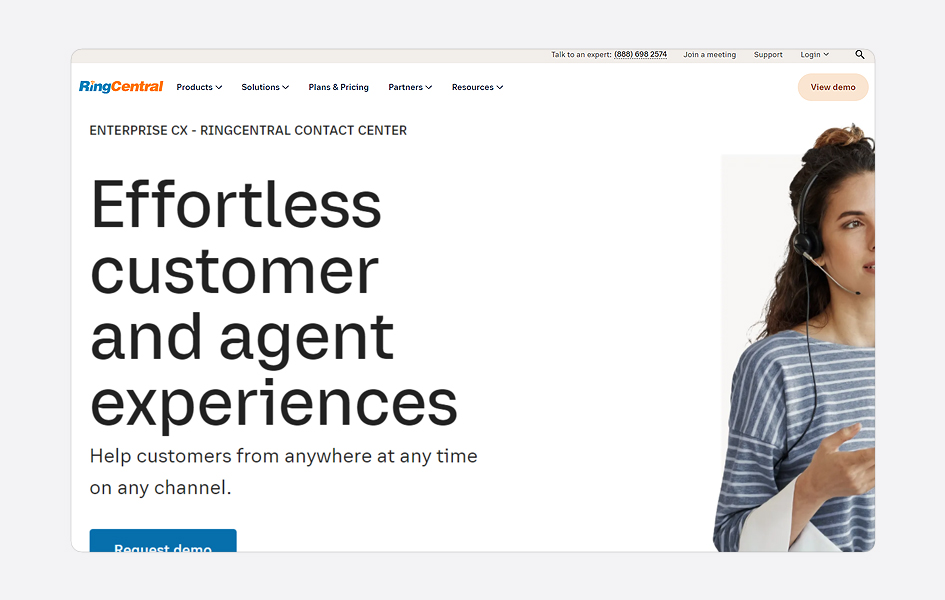
RingCentral Contact Center software provides tools for performance measurement and enhanced analytics and supports voice, chat, email, and other digital channels.
💰 Pricing plan
- Contact RingCentral’s sales team.
🖥️ Features
- Real-time Reporting and Analytics.
- Omnichannel Support.
- AI-based Sentiment Analysis and Skills-based Routing.
- CRM Integrations and Personalization.
- Remote Agent Support.
👍 Pros
- Accurate dashboard with full information.
- High-quality video and audio conferencing.
- The price is great for small businesses.
👎 Cons
- Iffy support on tickets and responses.
- Reporting and analytics features could be better.
- The system can only handle a few calls at once.
2. Nextiva Contact Center
Nextiva’s cloud contact center solution is an intelligent one that has all the features needed to deliver the best omnichannel customer service. Recently, the platform was recognized and praised for its reliability by G2’s Best Software Award and rated as one of the best in the world by Gartner.
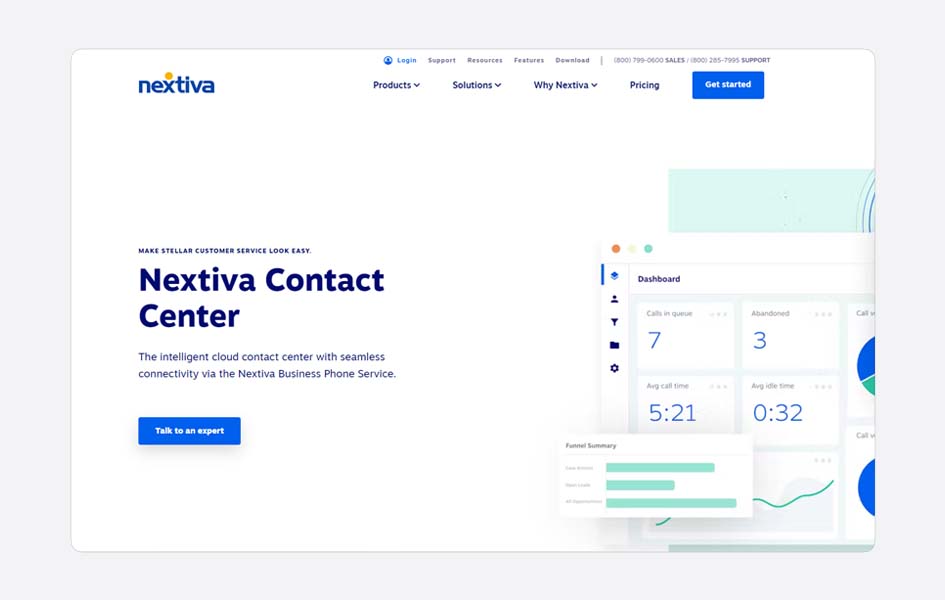
Nextiva Contact Center aims to streamline customer communication, empower agents, build customer loyalty, and help businesses of varying sizes deliver a differentiated customer experience.
💰 Pricing plan
- Starts at $50 per user/month (an additional $100 to $150 monthly for more advanced call center functionality).
🖥️ Features
- Call disposition.
- Intuitive software-based CTI.
- AI-powered IVR.
- Skill-based routing.
- Omnichannel routing.
👍 Pros
- User-friendly portals and back-end admin tools.
- You can set up specific employee permissions.
- Has reporting features.
👎 Cons
- Not very scalable.
- Support and functionality can be poor sometimes.
- Need to include more security features.
3. Vonage Contact Center
Known for its ability to bring everything, including CRM integrations, team productivity & satisfaction, customer first-call resolution, and cost controlling, Vonage’s omnichannel cloud contact center is ‘the one’ that is built to deliver exceptional customer journeys, with a focus on performance, reliability, and service resilience.
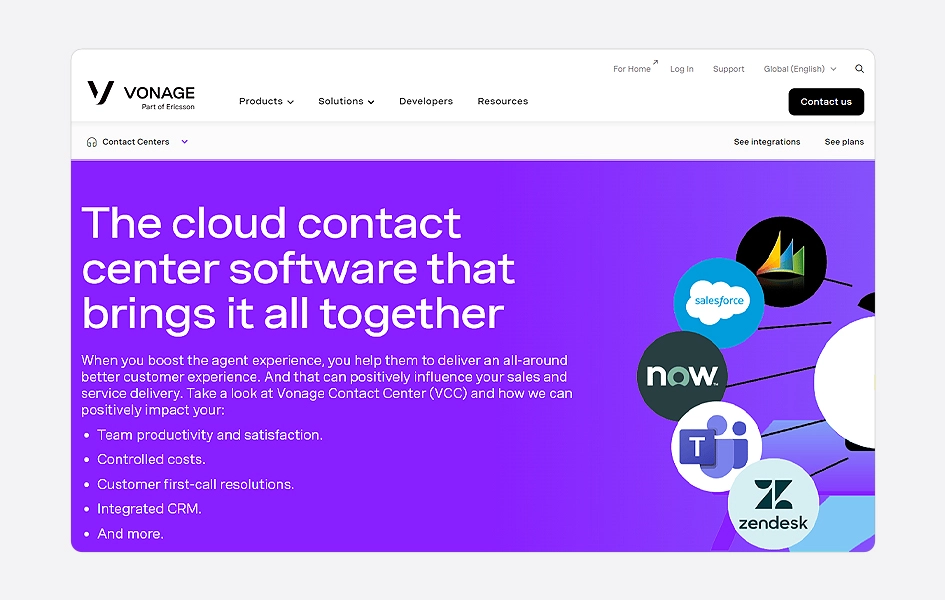
Vonage Contact Center offers a wide range of features that are a must to have, integrates easily with almost all business CRM tools, and allows organizations to adapt to evolving communication channels and customer preferences.
💰 Pricing plan
- Get a custom quote.
🖥️ Features
- Dynamic Routing and IVR.
- Team Monitoring and Quality Management.
- Full CRM integrations.
- Conversational Commerce.
- Dashboards and Analytics.
👍 Pros
- Low cost.
- Unlimited calling and texting.
- Calling options include phone, app, and softphone.
👎 Cons
- Limited customizability.
- Some UI aspects could be easier to use.
- Only online chat support.
4. Nice CXone
Like others on this roster, Nice CXone is also a cloud-based omnichannel contact center platform that helps organizations manage customer interactions across multiple communication channels. What makes it unique is that it offers a unified suite of different applications designed to help companies holistically run their contact center operations per their needs.
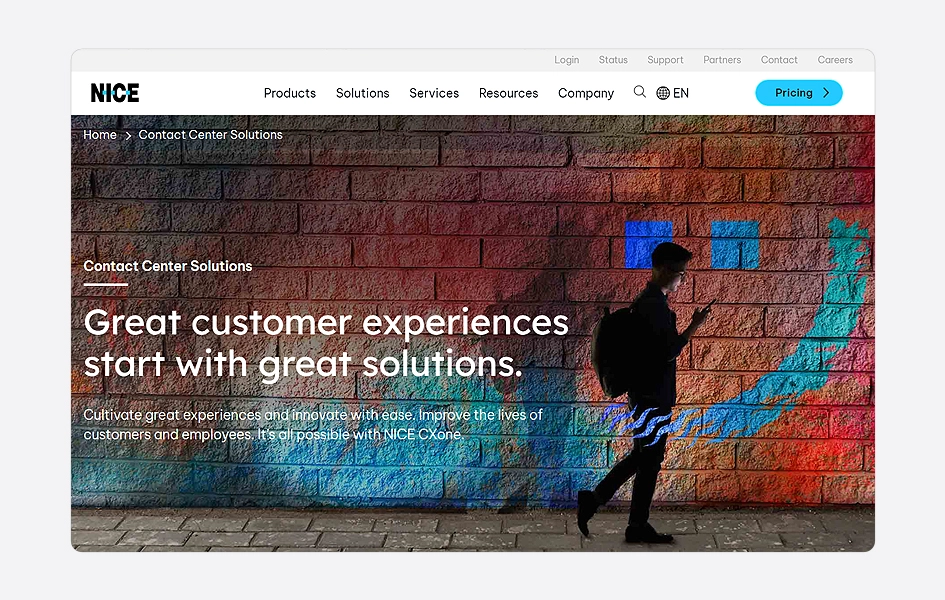
Nice CXone’s software helps customer service centers worldwide create profitable customer experiences by using its innovative tools like interaction analytics, customer surveys, reporting, performance management, and integrations that make it an all-in-one and capable solution.
💰 Pricing plan
- Custom quotes based on usage and features chosen.
🖥️ Features
- Pre-built CRM integrations.
- Enlighten AI Customer Self-Service.
- Agent Assistance.
- Workforce Engagement Suite.
- Interaction Channels.
👍 Pros
- Has a robust suite of call center software features.
- Provides 99.99% uptime.
- Has scalable Capabilities.
👎 Cons
- It can be expensive.
- It can be difficult to receive support.
- Has no account manager.
Closing Thoughts
To sum up, an omnichannel cloud contact solution is software used to improve the customer’s experience. And with the proper knowledge that we’ve provided to you with this article in your hands, you can take advantage of its numerous benefits to improve your business contact center’s service delivery and efficiency.
You can think of omnichannel software as a tool that, when used and appropriately implemented into a business’s contact center, could be used to trigger a shift in the way businesses approach customer communication across all platforms.
FAQs
How much does it cost to install an omnichannel contact center?
A cloud-based omnichannel contact center can cost you as low as $49 per agent per month or as high as $229 per agent per month for installation.
However, you should certainly take note that the actual price can significantly vary depending on the specific features, how it is hosted, its scalability, your geographical location, and the provider itself.
What is a Cloud Contact Center Solutions?
A cloud contact center solution is a software service that is hosted over the Internet and provided by a solution provider. And with it, businesses can manage all their customer interactions across various channels from a single, centralized hub.
What Types of Business Sizes are Suitable for Implementing Omnichannel Cloud Contact Centers?
Omnichannel cloud contact centers are an excellent way for organizations of all sizes to provide high-quality customer service. They allow customers to reach businesses and their contact centers through their preferred channels, whether it’s phone, email, chat, or social media.

